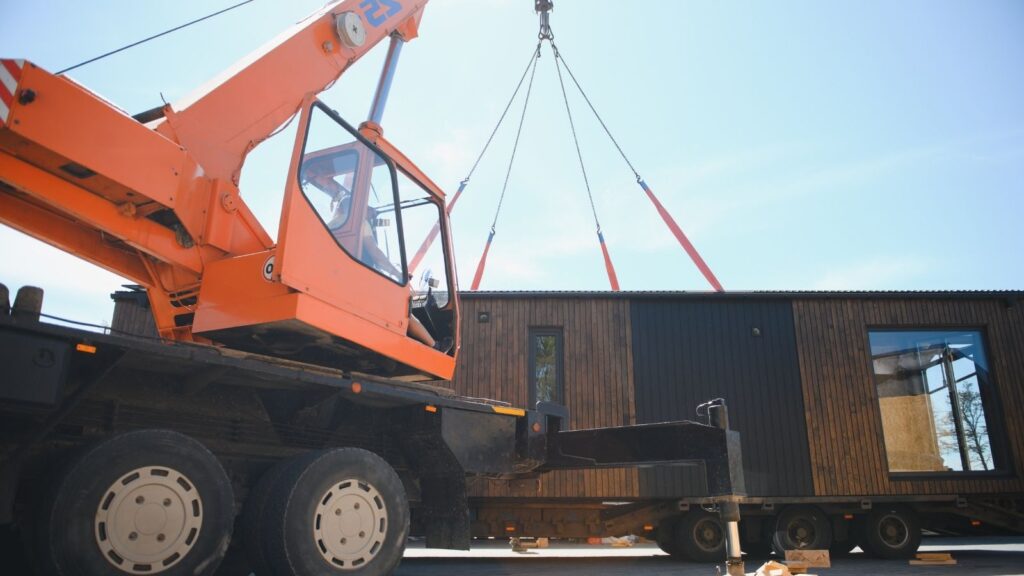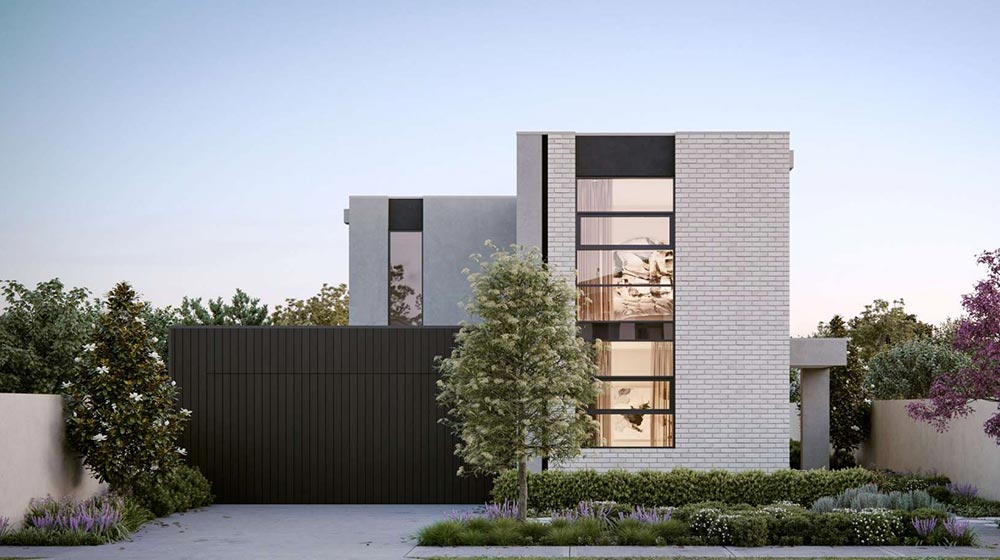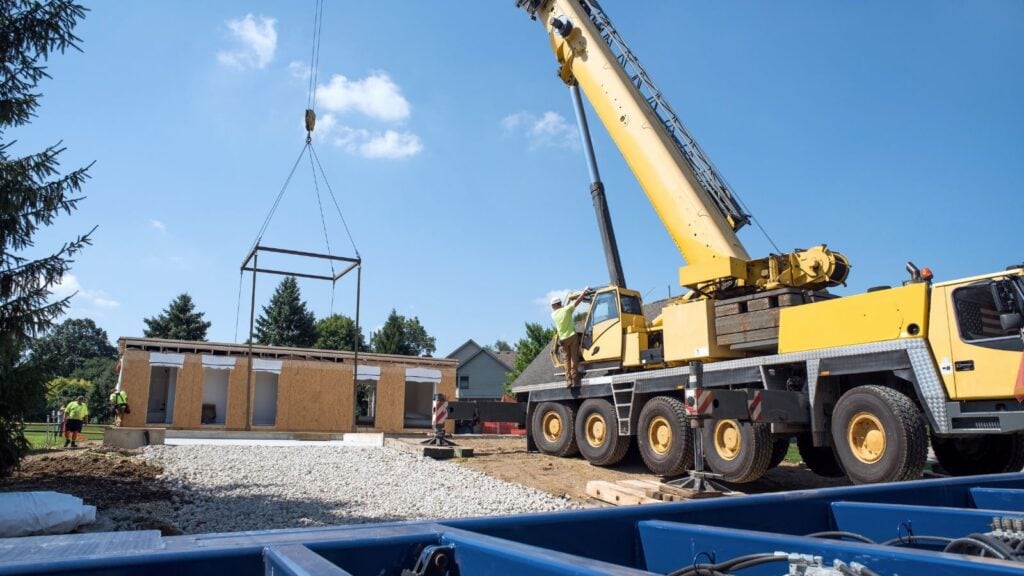In a world where speed, efficiency, and sustainability are paramount, steel frame prefab houses are rising in popularity and revolutionizing the future of home construction. With a blend of modern engineering and innovative design, these houses are quickly becoming the go-to choice for homeowners looking for a faster and more cost-effective way to build their dream homes.
Using steel frames as the primary structure, these prefab houses offer numerous advantages over traditional construction methods. They are not only durable and resistant to harsh weather conditions, but they are also highly customizable and easily adaptable to various architectural styles. From sleek and modern to cozy and rustic, the design possibilities are endless.
Furthermore, steel frame prefab houses are eco-friendly, using significantly fewer materials and producing less waste during the construction process. This not only reduces environmental impact but also makes these houses more energy-efficient, resulting in lower utility bills for homeowners.
As the demand for affordable and sustainable housing continues to grow, steel frame prefab houses are leading the way, transforming the future of home construction. Whether you’re a first-time homeowner or looking to upgrade, these innovative homes offer a compelling alternative to traditional construction methods.
Advantages of Steel Frame Prefab Houses
Steel frame prefab houses offer a wide range of advantages that make them an attractive option for homeowners. One of the key benefits is their durability and strength. Steel is known for its high tensile strength, making it resistant to extreme weather conditions such as hurricanes, earthquakes, and heavy snow loads. Unlike traditional wood-framed houses, steel frame prefab houses do not warp, crack, or rot over time, ensuring a long-lasting structure.
Another advantage is the customization options available with steel frame prefab houses. The flexibility of steel allows for unique architectural designs, giving homeowners the freedom to create their dream homes. Whether you prefer a minimalist modern aesthetic or a cozy rustic vibe, steel frame prefab houses can be tailored to suit your style and preferences.
Cost-efficiency is another significant advantage of steel frame prefab houses. The construction process is streamlined and efficient, reducing labor costs and construction time. Prefabricated components are manufactured in a controlled factory environment, minimizing waste and ensuring precise measurements. This leads to cost savings for homeowners, as they can avoid unexpected expenses and delays often associated with traditional construction methods.
The Growth and Popularity of Steel Frame Prefab Houses
The demand for steel frame prefab houses has been steadily growing in recent years. As more people recognize the advantages offered by these innovative homes, the industry has experienced significant growth. The ease and speed of construction, combined with the ability to customize the design, have made steel frame prefab houses an appealing choice for homeowners.
In addition to individual homeowners, builders and developers have also embraced steel frame prefab houses. The efficiency and cost-effectiveness of prefab construction allow for faster project completion and increased profitability. This has led to a surge in the number of steel frame prefab house communities and developments, catering to those seeking affordable and sustainable housing options.
Furthermore, the popularity of steel frame prefab houses is not limited to residential properties. Commercial and industrial sectors have also started adopting this construction method due to its advantages. From office buildings to warehouses, steel frame prefab construction offers a versatile and efficient solution for various applications.
The Environmental Benefits of Steel Frame Prefab Houses
Steel frame prefab houses are not only beneficial for homeowners but also for the environment. The construction process of these houses requires fewer raw materials compared to traditional construction methods. Steel, as a highly durable material, can be recycled, reducing the need for new resources and minimizing waste. This sustainable approach contributes to the overall reduction of carbon footprint and environmental impact.
Additionally, steel frame prefab houses are designed to be energy-efficient. The insulation and sealing techniques used in the construction process ensure minimal heat loss, resulting in lower energy consumption for heating and cooling. This not only reduces the environmental impact but also translates into significant cost savings for homeowners in terms of reduced energy bills.
Moreover, the environmental benefits extend beyond the construction phase. Steel frame prefab houses are often equipped with energy-efficient appliances and sustainable features such as solar panels and rainwater harvesting systems. These additions further reduce the environmental impact and contribute to a more sustainable way of living.
The Cost-Efficiency of Steel Frame Prefab Houses
One of the most significant advantages of steel frame prefab houses is their cost-efficiency. The streamlined construction process reduces labor costs and construction time, resulting in overall cost savings for homeowners. Prefabricated components are manufactured in a controlled factory environment, minimizing waste and ensuring accurate measurements, further reducing costs.
Additionally, the speed of construction provides financial benefits. Traditional on-site construction can be a lengthy process, subject to weather delays and unexpected expenses. In contrast, steel frame prefab houses are constructed off-site and then transported to the location, significantly reducing the time required for completion. This allows homeowners to move into their new homes faster, saving on temporary accommodation costs.
Furthermore, the durability and low maintenance requirements of steel frame prefab houses contribute to long-term cost savings. These houses are resistant to damage from pests, rot, and natural disasters, eliminating the need for costly repairs and maintenance. The energy-efficient features of these houses also result in lower utility bills, further reducing the overall cost of homeownership.
Design and Customization Options for Steel Frame Prefab Houses
Steel frame prefab houses offer a wide range of design and customization options, allowing homeowners to create their dream homes. The flexibility of steel as a construction material enables architects and designers to push the boundaries of traditional home design. From sleek and modern to rustic and cozy, steel frame prefab houses can be tailored to suit various architectural styles and personal preferences.
The customization options extend beyond the exterior design. The interior layout of these houses can be highly adaptable, allowing for open floor plans, spacious living areas, and creative use of space. Homeowners can choose from a variety of finishes, materials, and fixtures to create a unique and personalized living environment.
Furthermore, steel frame prefab houses can be easily expanded or modified in the future. The inherent strength and flexibility of steel make it possible to add additional rooms or make structural changes without compromising the integrity of the house. This adaptability ensures that homeowners can adjust their living spaces as their needs evolve over time.
The Durability and Strength of Steel Frame Prefab Houses
Steel frame prefab houses are known for their durability and strength. Steel, as a construction material, offers exceptional structural integrity and resistance to various external forces. Unlike traditional wood-framed houses, steel frame prefab houses do not warp, crack, or rot over time. This durability ensures a long-lasting and low-maintenance structure for homeowners.
Steel frames provide inherent stability to the structure, making these houses resistant to extreme weather conditions such as hurricanes, earthquakes, and heavy snow loads. The high tensile strength of steel allows the house to withstand these forces without compromising the safety and integrity of the occupants.
Additionally, steel frame prefab houses are resistant to pests such as termites and rodents, eliminating the need for costly pest control measures. This durability and resistance to external factors contribute to the long-term value and longevity of steel frame prefab houses.
The Technology Behind Steel Frame Prefab Houses
The construction process of steel frame prefab houses is a blend of modern technology and innovative engineering. Advanced computer-aided design (CAD) software is used to create precise and detailed plans for manufacturing the prefab components. This ensures accurate measurements and minimizes errors during the construction process.
Once the design is finalized, the components are manufactured in a controlled factory environment using automated machinery. This ensures consistency in quality and reduces the risk of human error. The precision manufacturing allows for efficient assembly on-site, further reducing construction time and costs.
Moreover, the use of technology extends beyond the construction phase. Steel frame prefab houses can be equipped with smart home features, allowing homeowners to control various aspects of their homes remotely. From temperature and lighting control to security systems and entertainment, these houses offer a seamless integration of technology for a modern and convenient living experience.
Challenges and Considerations When Choosing Steel Frame Prefab Houses
While steel frame prefab houses offer numerous advantages, there are also some challenges and considerations to keep in mind when choosing this construction method. One of the key considerations is the availability of skilled contractors and builders experienced in steel frame construction. It is important to work with professionals who have the necessary expertise to ensure the successful completion of the project.
Additionally, the customization options and design flexibility of steel frame prefab houses may come at a higher initial cost compared to standard designs. However, it is essential to consider the long-term cost savings and benefits associated with energy efficiency and low maintenance requirements.
Another consideration is the transportation logistics involved in delivering the prefab components to the construction site. Depending on the location and site accessibility, additional planning and coordination may be required to ensure a smooth and timely delivery.
Furthermore, it is important to check local building codes and regulations to ensure compliance with steel frame prefab construction. Some areas may have specific requirements or restrictions that need to be addressed during the planning and construction phase.
Conclusion: The Future of Home Construction with Steel Frame Prefab Houses
Steel frame prefab houses are revolutionizing the future of home construction. With their durability, cost-efficiency, and environmental benefits, these innovative homes offer a compelling alternative to traditional construction methods. The rise in popularity of steel frame prefab houses is a testament to the increasing demand for affordable and sustainable housing.
As technology continues to advance and design possibilities expand, the future of home construction with steel frame prefab houses looks promising. These houses provide homeowners with the opportunity to create their dream homes while minimizing environmental impact and maximizing cost savings.
Whether you’re a first-time homeowner or looking to upgrade, steel frame prefab houses offer endless possibilities for customization, durability, and strength. With their blend of modern engineering and innovative design, these houses are transforming the way we build and live in homes. Embracing the future of home construction with steel frame prefab houses is not only a smart choice but also a sustainable one.



